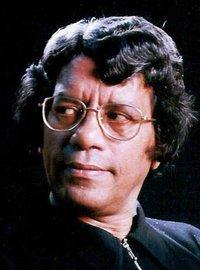HUMAYUN AZAD, (Rarikhal, Munshiganj, Bangladesh, 28 April 1947 - Munich, Germany, 11 August 2004) was a prolific Bangladeshi author and scholar. He wrote more than 70 books including 10 novels, 7 collections of poetry, 7 books of comparative literature and 2 books for children. Azad received the prestigious Bangla Academy Award (1996) and the Shishu Academy Award for his contributions in both adult and children literature.
Dr. Azad got his doctorate degree in linguistics in 1976 at the University of Edinburgh. He later served as a professor of Bangla at the University of Dhaka and in his early career produced pioneering works on Bangla linguistics, notably Bangla semantics. He was regarded as the most important living linguist of the one-thousand-year-old Bangla language. Later in his career, especially during General Ershad’s rule, he became well-known as a liberal socio-political critic as he wrote biting commentaries against the dictatorship in local magazines. His commentaries continued throughout the 1990s and were later published as books as they grew in numbers. A freethinker and an atheist, he fearlessly and openly criticized in his works the extremism in religions, including Islam, the major religion in Bangladesh.
Dr. Azad also published the first comprehensive book in Bangla on the subject of women called Naari (Bangla for “Woman”) in 1992. In this monumental tome, Azad painstakingly compiled the feminist ideas of the west that underlie the feminist contributions of the subcontinent’s socio-political reformers and exposed the anti-women stance of some legendary Bengali writers including Rabindranath Tagore. The work, critical of the patriarchal and male-chauvinistic attitude of religions towards women, attracted negative reaction from conservative censors and the Bangladeshi Government banned the book in 1995. The ban was eventually lifted in 2000, following a legal battle Azad won in the High Court.
On February 27, 2004, he was the victim of a vicious assassination attempt by unidentified assailants in broad daylight on the campus of the University of Dhaka. As he was returning to his Fuller Road residence from the yearly book fair held at the Bangla Academy premises, the assailants stopped him on the road and hacked at his neck and face with machetes and later used bombs to disperse the crowd who tried to rescue him. He subsequently fell into a life-threatening coma for four days, but eventually survived after receiving intensive treatment at the Combined Military Hospital in Dhaka. He then went to Singapore for further treatment of his critically damaged face. The incident created a huge backlash among the progressive liberals in the society and the public in general who were appalled at the lack of secuity that made this attack on one of the most renowned scholars in the country possible. The students of the university were especially agitated at this heinous crime against their beloved teacher on their very own campus and marched processions in protest.
The assassination attempt took place following the publication of his novel Pak Sar Jamin Saad Baad, a story based on religious groups in Bangladesh who collaborated with the Pakistani army during the 1971 independence war. In it he tried to expose the attitudes and activities of the Islamists and the nationalists in Bangladesh. He simulated a scenario that vividly portrayed fanatic and barbaric nature of these groups. Afterwards, Dr. Azad expressed that he had suffered severe mental trauma since the attack, but he also vowed to continue writing against the rise of Islamists in Bangladesh.
Islamists in Bangladesh, on the other hand, condemned the assassination attempt but simultaneously claimed that the novel injured the sentiments of the majority. They demanded that the novel be banned and a blasphemy law be passed so that no such book could be published in the future, a reaction not too dissimilar to their treatment of his earlier Naari.
On August 11, 2004, Dr. Azad was found dead in his apartment in Munich, Germany, where he had moved just a week prior to conduct research on the nineteenth century German romantic poet Heinrich Heine. Azad’s family in Bangladesh refused to acknowledge the German police force’s primary conclusions, which indicated a natural death.

No comments:
Post a Comment